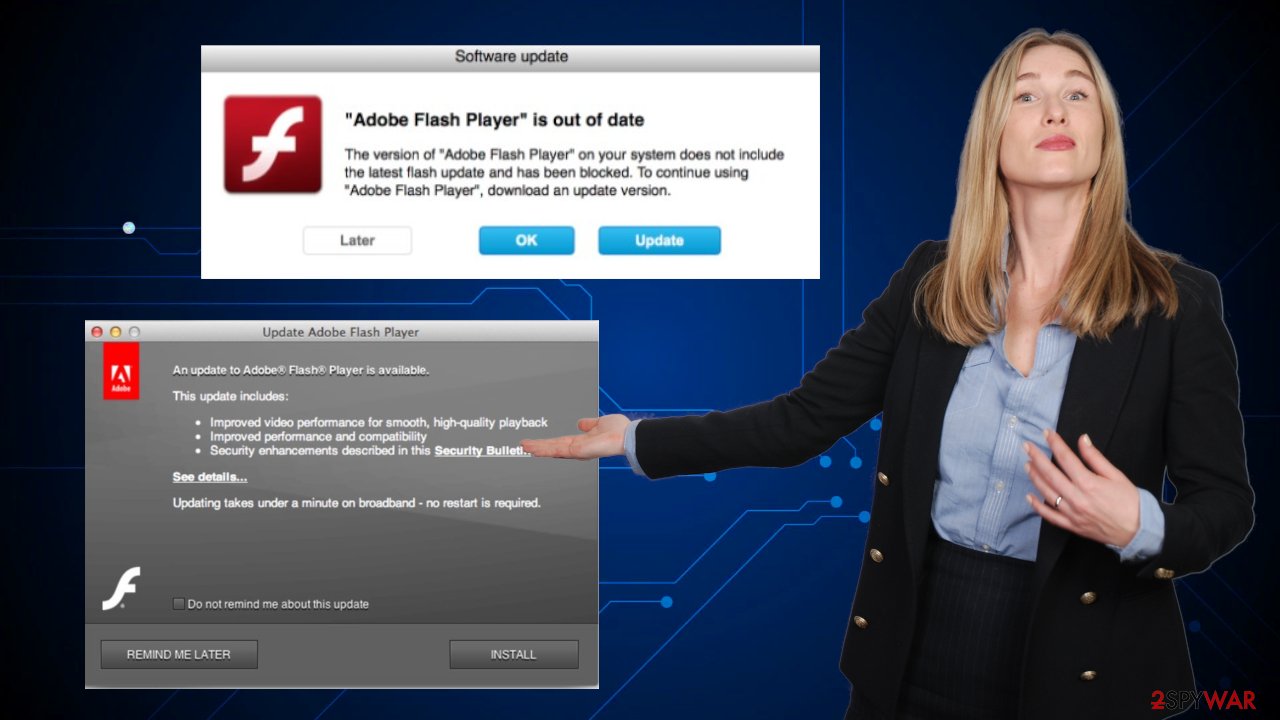Searcher4u.com (Removal Instructions) - Chrome, Firefox, IE, Edge
Searcher4u.com Removal Guide
What is Searcher4u.com?
Searcher4u.com – a browser hijacker that can affect Windows, Android, and Mac devices

Searcher4u.com is a potentially unwanted program[1] that modifies particular browser preferences (default search engine, new tab, homepage) in order to show search result pages from a search engine of its choice. By doing so, it can inject deceptive advertisements of affiliated portals into the results from Bing, Yahoo, and other legitimate sources.
By redirecting people through a fake search site, Searcher4u.com virus is capable of collecting various browsing-related information, such as the device and browser details, used apps, visited sites, search inquiries, geolocations, etc. This gathered intel is used to create ads specifically for you, making them irresistible.
Browser hijackers can only impede a normal working environment and pose dangers both to you and your device. This article's culprit can be installed either as an app or a browser extension on Android, Mac, or Windows devices. Either way, we're going to let you know how to safely remove it and restore your browser settings.
| name | Searcher4u.com |
|---|---|
| Type | Browser hijacker, PUP, redirect virus |
| Altered browser settings | Homepage, default search engine, new tab |
| Promoted fake search site | searcher4u.com, sch.searcher4u.com |
| IP address | 142.93.249.115 |
| Symptoms | Redirects to questionable sites, search traffic going through a new search engine, sluggish device performance |
| Risks | Financial losses, privacy issues, malware infections |
| Distribution | Freeware, fake Flash Player updates, deceptive ads |
| Removal | PUPs and any other unwelcomed guests should be eliminated by running a full system scan with a dependable anti-malware tool |
| System health check | Messy file system and residual files of removed infections could cause your device to exhibit strange behavior, such as crashing, freezing, and alike. Prevent that by running system diagnostics with time-proven FortectIntego system tools |
All browser hijackers, such as Searcher4u.com, Tabsearch.net, Searchfox.me, and tons of others, have many similarities. First of all, they change browser settings forcing victims to use a search site of their choice and then insert ads into the search results.
The main differences are the pre-selected search engines (they depend on your geolocation) and affiliated sites you might be forced to visit. Although types of these portals are mostly the same:
- gambling,
- push notification viruses,
- malware,
- porn,
- various scams,
- other PUPs.
You end up visiting any of these questionable or even malicious websites when you click on Searcher4u.com ads. Moreover, this browser hijacker might force you to visit these sites by causing sudden redirects. And lastly, this PUP can record your browsing habits, as stated before.

Thus it's unsafe to keep using it. Whether you installed it willingly or have no idea how it got on your device, you must eliminate it quickly. To remove Searcher4u.com automatically, use trustworthy anti-malware software such as SpyHunter 5Combo Cleaner or Malwarebytes. All you need to do is perform a full system scan and let the AV tool do the dirty work for you.
Although that might not be enough, cybersecurity experts[2] highly recommend using the all-in-one FortectIntego system diagnostics tool to finish Searcher4u.com removal from either device. Using this app will completely eliminate any traces of the infection and delete tracking cookies.
Avoid various computer infections by not downloading Flash Player updates
Deceptive ads are one of the main techniques used by the potentially unwanted program and malware developers to distribute their vile creations. Prompts falsely stating that you have a virus infection, that your software is outdated, and alike can be seen when visiting shady websites.
One of the most pervasive deceptive prompts is urging users to install or update Flash Player on their devices in-use. If you ever see such an ad, close the window immediately and never visit that site against, as Flash Player is discontinued, and the download will certainly contain malicious software.

A quick guide for Searcher4u.com virus removal
Browser hijackers, and other potentially unwanted programs, can be falsely advertised to increase your browsing speed, boost your device's performance tenfold, or other nonsense. In fact, Searcher4u.com virus and infections alike only diminish affected machines production and could result in other PUP or even malware[3] installation.
Therefore, you shouldn't wait for another second and take on the task of Searcher4u.com removal. You can accomplish it easily by using security tools. Although if it was installed as a browser extension, you would need to delete it manually. Since we're here to help, use our detailed free guides below.
Choose your infected browser, and by going step-by-step, you'll remove Searcher4u.com in no time. Afterward, we highly recommend using proper system diagnostics tools to delete any residual entries of the culprit in the system directories and other core system files/settings.
You may remove virus damage with a help of FortectIntego. SpyHunter 5Combo Cleaner and Malwarebytes are recommended to detect potentially unwanted programs and viruses with all their files and registry entries that are related to them.
Getting rid of Searcher4u.com. Follow these steps
Uninstall from Windows
Instructions for Windows 10/8 machines:
- Enter Control Panel into Windows search box and hit Enter or click on the search result.
- Under Programs, select Uninstall a program.

- From the list, find the entry of the suspicious program.
- Right-click on the application and select Uninstall.
- If User Account Control shows up, click Yes.
- Wait till uninstallation process is complete and click OK.

If you are Windows 7/XP user, proceed with the following instructions:
- Click on Windows Start > Control Panel located on the right pane (if you are Windows XP user, click on Add/Remove Programs).
- In Control Panel, select Programs > Uninstall a program.

- Pick the unwanted application by clicking on it once.
- At the top, click Uninstall/Change.
- In the confirmation prompt, pick Yes.
- Click OK once the removal process is finished.
Delete from macOS
Remove items from Applications folder:
- From the menu bar, select Go > Applications.
- In the Applications folder, look for all related entries.
- Click on the app and drag it to Trash (or right-click and pick Move to Trash)

To fully remove an unwanted app, you need to access Application Support, LaunchAgents, and LaunchDaemons folders and delete relevant files:
- Select Go > Go to Folder.
- Enter /Library/Application Support and click Go or press Enter.
- In the Application Support folder, look for any dubious entries and then delete them.
- Now enter /Library/LaunchAgents and /Library/LaunchDaemons folders the same way and terminate all the related .plist files.

Remove from Microsoft Edge
Delete unwanted extensions from MS Edge:
- Select Menu (three horizontal dots at the top-right of the browser window) and pick Extensions.
- From the list, pick the extension and click on the Gear icon.
- Click on Uninstall at the bottom.

Clear cookies and other browser data:
- Click on the Menu (three horizontal dots at the top-right of the browser window) and select Privacy & security.
- Under Clear browsing data, pick Choose what to clear.
- Select everything (apart from passwords, although you might want to include Media licenses as well, if applicable) and click on Clear.

Restore new tab and homepage settings:
- Click the menu icon and choose Settings.
- Then find On startup section.
- Click Disable if you found any suspicious domain.
Reset MS Edge if the above steps did not work:
- Press on Ctrl + Shift + Esc to open Task Manager.
- Click on More details arrow at the bottom of the window.
- Select Details tab.
- Now scroll down and locate every entry with Microsoft Edge name in it. Right-click on each of them and select End Task to stop MS Edge from running.

If this solution failed to help you, you need to use an advanced Edge reset method. Note that you need to backup your data before proceeding.
- Find the following folder on your computer: C:\\Users\\%username%\\AppData\\Local\\Packages\\Microsoft.MicrosoftEdge_8wekyb3d8bbwe.
- Press Ctrl + A on your keyboard to select all folders.
- Right-click on them and pick Delete

- Now right-click on the Start button and pick Windows PowerShell (Admin).
- When the new window opens, copy and paste the following command, and then press Enter:
Get-AppXPackage -AllUsers -Name Microsoft.MicrosoftEdge | Foreach {Add-AppxPackage -DisableDevelopmentMode -Register “$($_.InstallLocation)\\AppXManifest.xml” -Verbose

Instructions for Chromium-based Edge
Delete extensions from MS Edge (Chromium):
- Open Edge and click select Settings > Extensions.
- Delete unwanted extensions by clicking Remove.

Clear cache and site data:
- Click on Menu and go to Settings.
- Select Privacy, search and services.
- Under Clear browsing data, pick Choose what to clear.
- Under Time range, pick All time.
- Select Clear now.

Reset Chromium-based MS Edge:
- Click on Menu and select Settings.
- On the left side, pick Reset settings.
- Select Restore settings to their default values.
- Confirm with Reset.

Remove from Mozilla Firefox (FF)
Remove dangerous extensions:
- Open Mozilla Firefox browser and click on the Menu (three horizontal lines at the top-right of the window).
- Select Add-ons.
- In here, select unwanted plugin and click Remove.

Reset the homepage:
- Click three horizontal lines at the top right corner to open the menu.
- Choose Options.
- Under Home options, enter your preferred site that will open every time you newly open the Mozilla Firefox.
Clear cookies and site data:
- Click Menu and pick Settings.
- Go to Privacy & Security section.
- Scroll down to locate Cookies and Site Data.
- Click on Clear Data…
- Select Cookies and Site Data, as well as Cached Web Content and press Clear.

Reset Mozilla Firefox
If clearing the browser as explained above did not help, reset Mozilla Firefox:
- Open Mozilla Firefox browser and click the Menu.
- Go to Help and then choose Troubleshooting Information.

- Under Give Firefox a tune up section, click on Refresh Firefox…
- Once the pop-up shows up, confirm the action by pressing on Refresh Firefox.

Remove from Google Chrome
Delete malicious extensions from Google Chrome:
- Open Google Chrome, click on the Menu (three vertical dots at the top-right corner) and select More tools > Extensions.
- In the newly opened window, you will see all the installed extensions. Uninstall all the suspicious plugins that might be related to the unwanted program by clicking Remove.

Clear cache and web data from Chrome:
- Click on Menu and pick Settings.
- Under Privacy and security, select Clear browsing data.
- Select Browsing history, Cookies and other site data, as well as Cached images and files.
- Click Clear data.

Change your homepage:
- Click menu and choose Settings.
- Look for a suspicious site in the On startup section.
- Click on Open a specific or set of pages and click on three dots to find the Remove option.
Reset Google Chrome:
If the previous methods did not help you, reset Google Chrome to eliminate all the unwanted components:
- Click on Menu and select Settings.
- In the Settings, scroll down and click Advanced.
- Scroll down and locate Reset and clean up section.
- Now click Restore settings to their original defaults.
- Confirm with Reset settings.

Delete from Safari
Remove unwanted extensions from Safari:
- Click Safari > Preferences…
- In the new window, pick Extensions.
- Select the unwanted extension and select Uninstall.

Clear cookies and other website data from Safari:
- Click Safari > Clear History…
- From the drop-down menu under Clear, pick all history.
- Confirm with Clear History.

Reset Safari if the above-mentioned steps did not help you:
- Click Safari > Preferences…
- Go to Advanced tab.
- Tick the Show Develop menu in menu bar.
- From the menu bar, click Develop, and then select Empty Caches.

After uninstalling this potentially unwanted program (PUP) and fixing each of your web browsers, we recommend you to scan your PC system with a reputable anti-spyware. This will help you to get rid of Searcher4u.com registry traces and will also identify related parasites or possible malware infections on your computer. For that you can use our top-rated malware remover: FortectIntego, SpyHunter 5Combo Cleaner or Malwarebytes.
How to prevent from getting browser hijacker
Do not let government spy on you
The government has many issues in regards to tracking users' data and spying on citizens, so you should take this into consideration and learn more about shady information gathering practices. Avoid any unwanted government tracking or spying by going totally anonymous on the internet.
You can choose a different location when you go online and access any material you want without particular content restrictions. You can easily enjoy internet connection without any risks of being hacked by using Private Internet Access VPN.
Control the information that can be accessed by government any other unwanted party and surf online without being spied on. Even if you are not involved in illegal activities or trust your selection of services, platforms, be suspicious for your own security and take precautionary measures by using the VPN service.
Backup files for the later use, in case of the malware attack
Computer users can suffer from data losses due to cyber infections or their own faulty doings. Ransomware can encrypt and hold files hostage, while unforeseen power cuts might cause a loss of important documents. If you have proper up-to-date backups, you can easily recover after such an incident and get back to work. It is also equally important to update backups on a regular basis so that the newest information remains intact – you can set this process to be performed automatically.
When you have the previous version of every important document or project you can avoid frustration and breakdowns. It comes in handy when malware strikes out of nowhere. Use Data Recovery Pro for the data restoration process.
- ^ Potentially Unwanted Program (PUP). Techopedia. Professional it insights.
- ^ Dieviren. Dieviren. Spyware news and security.
- ^ Roger A. Grimes. 9 types of malware and how to recognize them. Cso. Security news, features and updates.
